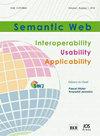ciTIzen-centric DAta pLatform (TIDAL): Sharing distributed personal data in a privacy-preserving manner for health research
IF 2.9
3区 计算机科学
Q2 COMPUTER SCIENCE, ARTIFICIAL INTELLIGENCE
引用次数: 3
Abstract
Developing personal data sharing tools and standards in conformity with data protection regulations is essential to empower citizens to control and share their health data with authorized parties for any purpose they approve. This can be, among others, for primary use in healthcare, or secondary use for research to improve human health and well-being. Ensuring that citizens are able to make fine-grained decisions about how their personal health data can be used and shared will significantly encourage citizens to participate in more health-related research. In this paper, we propose a ciTIzen-centric DatA pLatform (TIDAL) to give individuals ownership of their own data, and connect them with researchers to donate the use of their personal data for research while being in control of the entire data life cycle, including data access, storage and analysis. We recognize that most existing technologies focus on one particular aspect such as personal data storage, or suffer from executing data analysis over a large number of participants, or face challenges of low data quality and insufficient data interoperability. To address these challenges, the TIDAL platform integrates a set of components for requesting subsets of RDF (Resource Description Framework) data stored in personal data vaults based on SOcial LInked Data (Solid) technology and analyzing them in a privacy-preserving manner. We demonstrate the feasibility and efficiency of the TIDAL platform by conducting a set of simulation experiments using three different pod providers (Inrupt, Solidcommunity, Self-hosted Server). On each pod provider, we evaluated the performance of TIDAL by querying and analyzing personal health data with varying scales of participants and configurations. The reasonable total time consumption and a linear correlation between the number of pods and variables on all pod providers show the feasibility and potential to implement and use the TIDAL platform in practice. TIDAL facilitates individuals to access their personal data in a fine-grained manner and to make their own decision on their data. Researchers are able to reach out to individuals and send them digital consent directly for using personal data for health-related research. TIDAL can play an important role to connect citizens, researchers, and data organizations to increase the trust placed by citizens in the processing of personal data.以公民为中心的数据平台(TIDAL):以保护隐私的方式共享分布的个人数据,用于卫生研究
制定符合数据保护条例的个人数据共享工具和标准对于使公民能够控制其健康数据并为其批准的任何目的与被授权方共享其健康数据至关重要。除其他外,这可以主要用于医疗保健,也可以用于改善人类健康和福祉的研究。确保公民能够对如何使用和共享个人健康数据做出精细的决定,将极大地鼓励公民参与更多与健康相关的研究。在本文中,我们提出了一个以公民为中心的数据平台(TIDAL),让个人拥有自己的数据,并将他们与研究人员联系起来,以捐赠他们的个人数据用于研究,同时控制整个数据生命周期,包括数据访问,存储和分析。我们认识到,大多数现有技术都侧重于个人数据存储等特定方面,或者在执行大量参与者的数据分析时受到影响,或者面临数据质量低和数据互操作性不足的挑战。为了应对这些挑战,TIDAL平台集成了一组组件,用于请求存储在基于社会关联数据(Solid)技术的个人数据保管库中的RDF(资源描述框架)数据子集,并以保护隐私的方式对其进行分析。我们通过使用三种不同的pod提供商(interrupt, Solidcommunity, Self-hosted Server)进行一组模拟实验来证明TIDAL平台的可行性和效率。在每个pod提供商上,我们通过查询和分析不同参与者规模和配置的个人健康数据来评估TIDAL的性能。合理的总时间消耗以及所有pod提供商的pod数量和变量之间的线性相关性表明了在实践中实施和使用TIDAL平台的可行性和潜力。TIDAL使个人能够以细粒度的方式访问他们的个人数据,并对他们的数据做出自己的决定。研究人员能够接触到个人,并直接向他们发送数字同意书,同意将个人数据用于与健康相关的研究。TIDAL可以发挥重要作用,将公民、研究人员和数据组织联系起来,增加公民对个人数据处理的信任。
本文章由计算机程序翻译,如有差异,请以英文原文为准。
求助全文
约1分钟内获得全文
求助全文
来源期刊

Semantic Web
COMPUTER SCIENCE, ARTIFICIAL INTELLIGENCEC-COMPUTER SCIENCE, INFORMATION SYSTEMS
CiteScore
8.30
自引率
6.70%
发文量
68
期刊介绍:
The journal Semantic Web – Interoperability, Usability, Applicability brings together researchers from various fields which share the vision and need for more effective and meaningful ways to share information across agents and services on the future internet and elsewhere. As such, Semantic Web technologies shall support the seamless integration of data, on-the-fly composition and interoperation of Web services, as well as more intuitive search engines. The semantics – or meaning – of information, however, cannot be defined without a context, which makes personalization, trust, and provenance core topics for Semantic Web research. New retrieval paradigms, user interfaces, and visualization techniques have to unleash the power of the Semantic Web and at the same time hide its complexity from the user. Based on this vision, the journal welcomes contributions ranging from theoretical and foundational research over methods and tools to descriptions of concrete ontologies and applications in all areas. We especially welcome papers which add a social, spatial, and temporal dimension to Semantic Web research, as well as application-oriented papers making use of formal semantics.
 求助内容:
求助内容: 应助结果提醒方式:
应助结果提醒方式:


